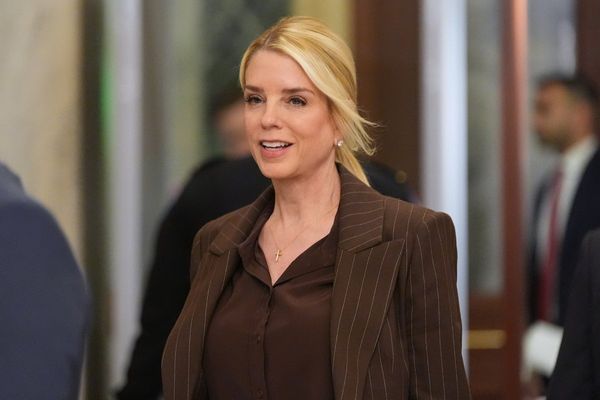
It’s hard enough being a working mother of young children, especially one in the process of getting divorced, without being smeared in the press as a bad mum. That’s what’s been happening to the actor Sophie Turner since her split from her pop singer husband, Joe Jonas, with various reports appearing on celebrity gossip websites casting aspersions on her parenting. Apparently “she likes to party, he likes to stay at home”, he’s been in “dad mode” caring for his own children “pretty much all of the time” (Turner has been filming in the UK), and, in deciding to divorce, is taking “the best course of action for his girls”.
The misogynistic undercurrents of these reports are clear: Turner is an irresponsible, absent mother who has had the audacity to make childcare arrangements with her partner in order to work, and worse, attend a wrap party where cocktails – cocktails! – were freely available. Meanwhile, Jonas is a present, loving father who is going above and beyond for his children, and is choosing to divorce their mother, it is implied, for their own welfare.
I’m not usually interested in celebrity gossip, but the backlash to these anonymously sourced reports has been fierce and, I think, interesting. Women, especially, have refused to buy it. The tide has been turning against the cult of perfect motherhood for a long while now: from all the Slummy Mummy and Why Mummy Drinks books and the Bad Moms film to an increasing body of literature and cinema taking the question more seriously. Warts-and-all social media motherhood accounts are hugely popular. Instagram abounds with funny reels about motherhood; the writer Lucy Huber’s tweets about parenting a toddler and an infant frequently go viral. There remains a huge amount of pressure to do things “right”, but with each generation of new mothers, more and more women seem to be resisting this culture of judgment.
“Sophie Turner isn’t a bad mom. You’re just a misogynist,” read one response piece, in Rolling Stone. The writer even went as far as to state: “Turner has ended up with the same label as countless maligned maternal figures throughout history, from Medea to Mama Rose,” which, I have to admit, made me laugh out loud. I can see what the writer is getting at, but if I were being framed as a bad mother for a night on the tiles in Birmingham during my divorce, I’m not sure I’d want to be mentioned in the same breath as a character in a Greek tragedy who, following hers, slaughters her own children with a sword for revenge.

What does it mean to be a “bad mother” in 2023? As in the ancient world, there are the bad mothers who harm or abuse their children, for which the greatest condemnation is reserved. But under modern capitalism, there are also the mothers who make the “wrong” choices: to work (too much, or too little) or to give formula, or to drink alcohol while breastfeeding (or, in Turner’s case, while being on the other side of the world for work reasons). There are the mothers who choose to use reins, and those who allow their children too much screen time (but God forbid they ever dare look at their phones in the presence of their poor, neglected child – they could have spent the whole morning doing intensive one-to-one creative play and be checking a quick email, but someone nearby will still tut). How poor these choices are considered depends on what the norms are at the time. Fathers, and their choices, you will notice, tend not to face the same scrutiny.
In a way, though, the clunkiness of the above conflation between the mothers who murder and the mothers who are simply “flawed” does hint at something true: the extent to which society fears any expression, however mild or implied, of maternal ambivalence or a desire for more freedom. Why is it so terrifying? Is it because it makes us wonder if our own mothers have at times regretted us? Despised us? Even in moments of desperation wished us away, or wanted to hurt us?
Of course, there’s a world of difference between saying that since having children you miss freedoms such as being able to go to the toilet on your own, or that, after having your baby, you had to go through a period of mourning for your old life (both things mothers have confessed to me), and those mothers who harm their own children. In fact, I have found it almost unbearable to read about the complex, darker emotions that can coincide with motherhood since having my son because the academic works often look at those cases where mothers kill. This is, of course, necessary, and as Adrienne Rich notes in Of Woman Born, a culture of taboo and silence around maternal ambivalence, or “lucid rebellion”, will only render extreme cases more likely.
It’s far easier to shut down a struggling mother before she says something truly challenging than to engage with her. Huber’s parenting tweets may be popular, but the abuse she receives for even the mildest of observations is something to behold. It can’t be easy. While writing this column, I’ve been touched by the positive responses, but there have been occasional comments that have truly wounded me, the worst being when I was finding things hard and being honest about it. A good mother would parent with a smile on her face, always.
I don’t know what kind of mother Turner is, but if she’s anything like me, or any other mother I know, she’s probably giving herself enough of a hard time already. The cult of perfect motherhood may be slowly crumbling, but dismantling our own maternal guilt after years of social conditioning is another matter altogether.
What’s working
Washing up liquid, the ultimate stain remover. Please forgive me for segueing into household tips, but it’s miraculous. I detest most housework, but for some reason get great satisfaction from stain removal. Were I devising an advertising campaign for Fairy Liquid, this is the angle I’d go for. The only thing it hasn’t been able to remove is dried-on vomit stains on the baby’s mattress (any tips welcome).
What’s not
Postpartum friendships, apparently. I enjoyed this article in New York magazine about the impact a baby can have on friendship groups, although I didn’t identify. What’s changed, I think, is that more and more women are choosing to be child-free and feeling entitled to child-free time, whereas historically they would be roped into communal childrearing. It’s a reasonable expectation, but we all need to be kind to one another, and new parents are especially vulnerable. Having a baby can be like a bomb going off in your life, and at times like that you need your friends more than ever, even if they’re sick of hearing about it.
Rhiannon Lucy Cosslett is a Guardian columnist
Do you have an opinion on the issues raised in this article? If you would like to submit a response of up to 300 words by email to be considered for publication in our letters section, please click here.







